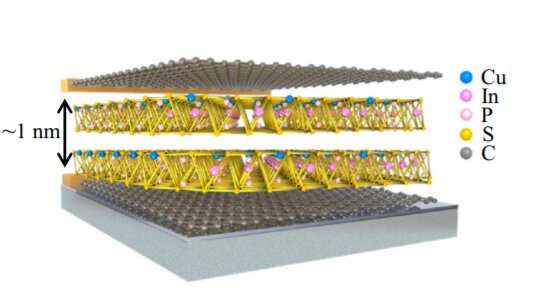The schematic structure of 2D BPVE device. Credit: LI Yue
Bulk photovoltaic effect (BPVE) is widely used in generating electricity. As a process of energy transference from photons to electrons and of voltage formation within ferroelectric material, BPVE acts like a dam, raising up "water" (voltage) to generate "power" (electric currents). Researchers have realized high photovoltage beyond theoretical Shockley-Queisser (SQ) limit in previous studies, however, the density of photocurrent generated through conventional methods remains relatively low.
In a study published in Nature Communications, a research team led by Prof. Zeng Hualing and Prof. Gong Ming from the University of Science and Technology of China (USTC) of the Chinese Academy of Sciences realized remarkable photocurrent density in a two-dimensional (2D) material CuInP2S6 (CIPS) with layered van der Waals (vdW) structure. They achieved measurable control over the magnitude of BPVE under the condition of applied electric field, incident light field as well as temperature field.
Based on characteristic of the atomic thickness of layered ferroelectric material and the weak vdW force between layers, researchers constructed a vertical structure by combining graphene with a couple of layers of CIPS. In this way, they achieved a high density of photocurrent without applied bias, realizing the measurable control over the magnitude of BPVE. Besides, through the regulation and control of photocurrents, researchers verified that two-dimensional ferroelectric polarization is the main physical mechanism of enhanced BPVE.
Moreover, by altering the thickness of two-dimensional ferroelectric layers, researchers clearly demonstrated dimensional transition of BPVE. And they found that the performance of 2D photovoltaics fell in between the 1D and 3D bulk photovoltaics, indicating that device dimensionality was one of the key factors in developing high-efficiency BPVE-based photovoltaics.
The findings highlight the potential of ultrathin 2D ferroelectrics for developing the third-generation solar cells with high efficiency beyond the fundamental SQ limit.
More information: Yue Li et al, Enhanced bulk photovoltaic effect in two-dimensional ferroelectric CuInP2S6, Nature Communications (2021). DOI: 10.1038/s41467-021-26200-3
Journal information: Nature Communications
Provided by University of Science and Technology of China
























